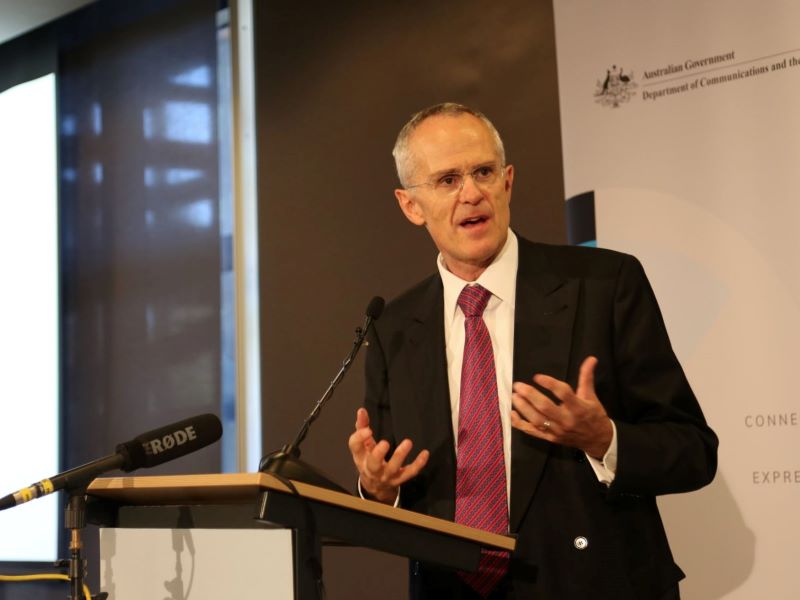Outgoing competition watchdog Rod Sims has laid out a post-pandemic economic reform plan for Australia centred on new merger rules, further crackdowns on Big Tech and a complete rework of privacy laws.
Mr Sims also flagged further regulatory crackdowns targeted at large digital platforms, with a new discussion paper on the topic to be released next week.
Mr Sims will depart as chair of the Australian Competition and Consumer Commissioner (ACCC) next month after more than a decade in the role. He delivered his final address to the National Press Club in Canberra on Wednesday afternoon, flagging the key areas to be addressed going forward.
These include more regulations for large digital platforms, significant reforms to the Privacy Act and improvements to merger rules.

Mr Sims pointed to the implementation of the News Media Bargaining Code, which was recommended and developed by the ACCC, as one of his successes during his time at the competition watchdog.
But he said more regulations are required to rein in Big Tech, and the ACCC will be unveiling a discussion paper on this topic next week outlining a range of options for reform. These options will include up-front rules to prevent the “worst abuses of dominance” and to protect consumers.
“There are so many other issues and action will occur internationally with Australia so very well placed to continue to be at the forefront. If we are, we can help shape a sustainable internet to the benefit of Australians and Australian businesses,” Mr Sims said in the speech.
There also needs to be a reworking of the regulatory arrangements for the National Broadband Network (NBN) to ensure the focus is on delivering a good service for Australians, rather than making a return on the $50 billion already spent on it.
“After spending $50 billion on the NBN, the objective must not be a commercial return on the sunk investment. It must be making the best use of this great asset,” he said.
“The prices that allow the NBN to get a commercial return on all its outlays, and the prices that make best use of this expensive asset, are very likely quite different. We all saw the benefit of having the NBN completed in time for the pandemic lockdowns. This is just a taste of the benefits if we get NBN pricing right. Prices must allow NBN to keep investing as needed but must also see optimum use made of it.”
Mr Sims has advocated for stronger merger laws for several years, and reiterated the need for this in his last speech as ACCC boss.
He said that Australia’s economy suffers from high levels of market concentration to the detriment of individuals and small businesses, and that companies which already have substantial market power should not be able to acquire another firm if it would significantly increase their market power or extend or entrench it.
“Australia is almost unique in not having a formal merger approval system. Further, the ACCC must prove, if a matter goes to court, that future negative consequences will occur, which can only be speculated on, against the so-called real-world evidence of the necessarily self-interested merger parties about what will happen in the future,” he said.
“The most important tool to prevent this is our merger laws and they are not up to the task. Australia is currently facing supply and logistics challenges. I think these are made worse by our market concentration in so many areas and by our infrastructure bottlenecks.”
There has too often been a focus from governments on how much they can sell infrastructure assets for rather than how it will benefit the wider economy, Mr Sims said. He pointed to the sale of electronic property conveyance service Pexa by state governments, which now operates as a monopoly and “makes life very hard for would-be competitors”.
“I believe all governments need to sign up to a checklist before infrastructure assets are sold to avoid provisions which restrict competition and to ensure there is appropriate regulation where monopoly or significant market power will exist post-sale,” Mr Sims said.
Australia’s privacy laws are seen as an “insufficient protection”, and the current review of the Privacy Act needs to see them significantly strengthened, the ACCC chair said. This will benefit the ongoing roll out of the Consumer Data Right (CDR), he said.
“Our general privacy laws were seen as insufficient protection when putting the CDR together, which is why it is terrific that the ACCC-recommended Privacy Act review is currently underway,” Mr Sims said.
“It is vital that significant changes are made to the Privacy Act, and this is a crucial part of the agenda I am outlining today. The CDR shows we can use data well and protect privacy if we want to . In my view, we will only gain the great benefits possible from data if we improve our privacy laws.”
In terms of his legacy, Mr Sims pointed to the ACCC’s legal wins over Trivago and Google, “world-leading” action against digital platforms, and last year’s News Media Bargaining Code.
He said he would not be retiring, and would continue to advocate for many of these issues in Australia and internationally in new roles in the future.
Do you know more? Contact James Riley via Email.


It’s worth remembering that the ACCC’s flawed decision to insist on 121 ‘points of interconnect’ for the NBN effectively destroyed any real chance of price competition at the retail level, which was a key objective of Labor’s model.